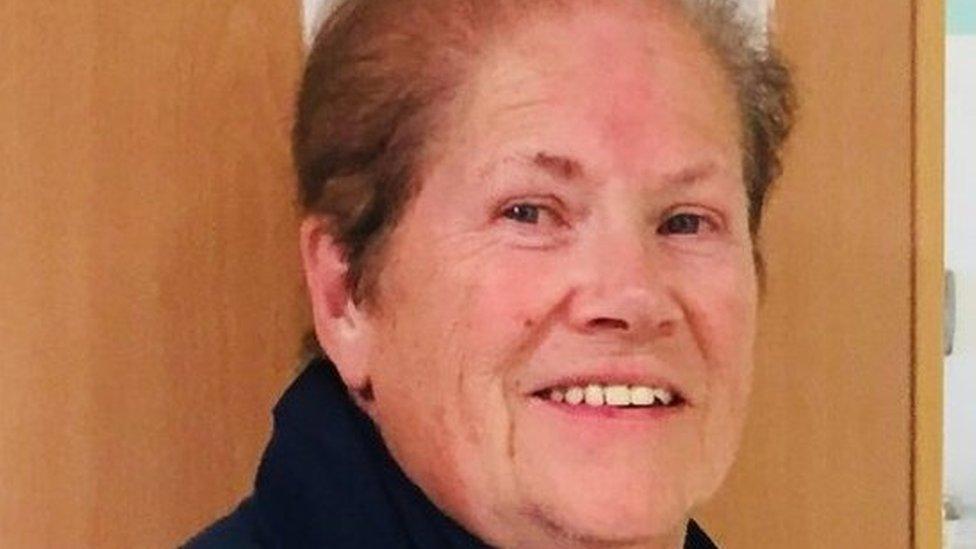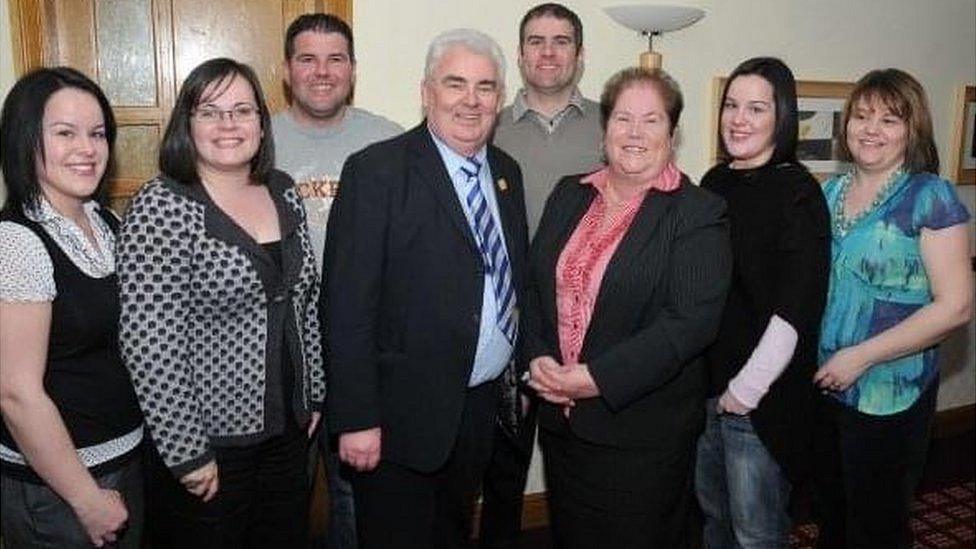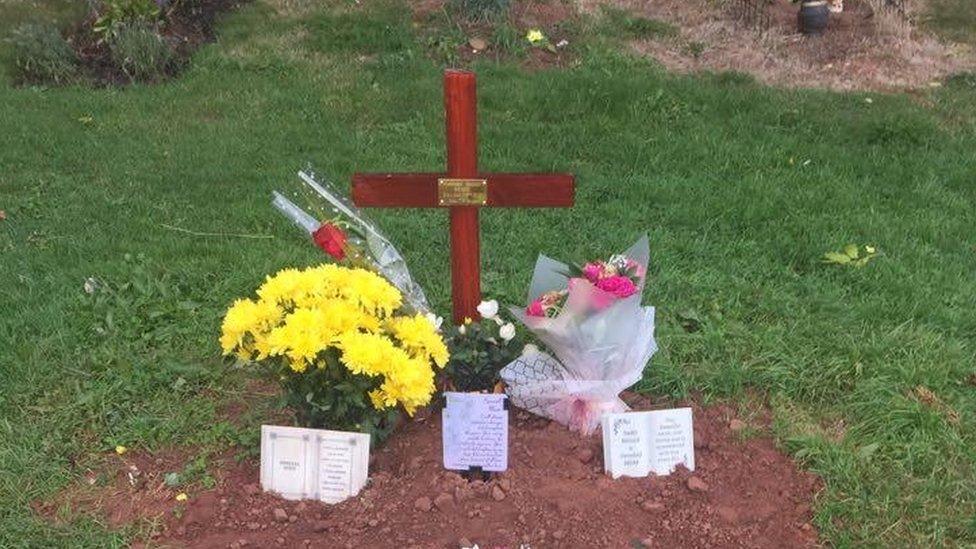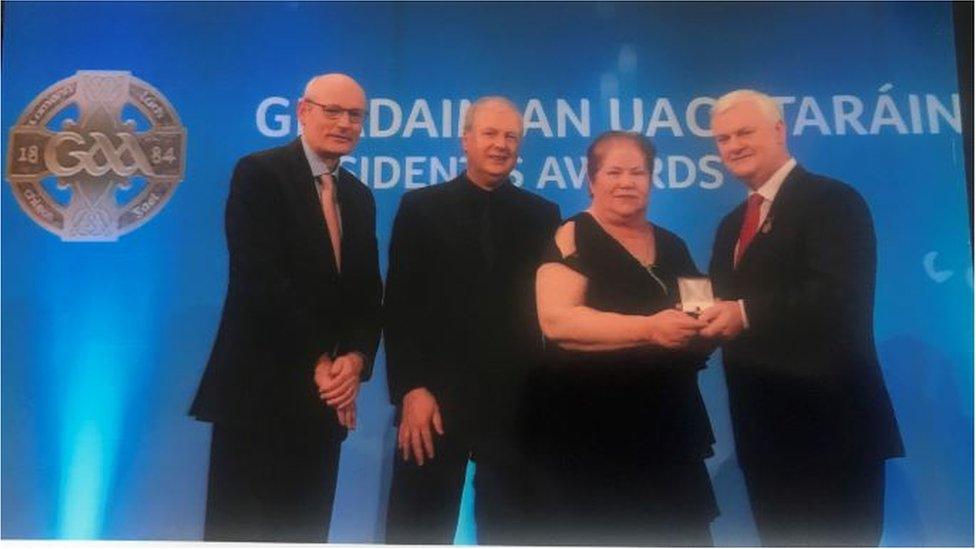Woman loses bid for Irish epitaph on mother's grave
- Published

Margaret Keane died suddenly aged 73 in July 2018
A woman has lost her quest to have an Irish epitaph engraved without translation on her mother's tombstone in an English cemetery.
Caroline Newey's mother, Margaret Keane died two years ago and is buried in grounds owned by St Giles' Church, Exhall, north of Coventry.
Mrs Newey wanted her mother's headstone inscription to read: "In ár gcroíthe go deo" ("In our hearts forever").
But a judge said untranslated, this may "be seen as a political statement".
"Given the passions and feelings connected with the use of Irish Gaelic, there is a sad risk that the phrase would be regarded as some form of slogan or that its inclusion without translation would, of itself, be seen as a political statement," said Judge Stephen Eyre, QC, chancellor of the Diocese of Coventry.
Untranslated Irish words would be "unintelligible to all but a small minority of readers", he ruled in his judgment for the Church of England consistory court on 6 May.
He authorised a memorial which included a translation of the phrase in English.
Grieving 'suspended'
Mrs Keane's family say they are devastated by the decision - which follows a two-year battle to have the gravestone of their choice in the cemetery at the Meadows in Ash Green, Coventry.
Margaret and her husband Bernie Keane, who survives her, were both born in the Republic of Ireland but made their lives in the United Kingdom.

Margaret Keane pictured with her husband Bernie and their children, Caroline (who made the petition to court), Bernadette, Vincent, Michael, Margaret and Donna
Both were very proud of their Irish heritage and were active in the Gaelic Athletic Association, (GAA) - Ireland's largest sporting organisation.
Her family wanted to include a Celtic Cross and a GAA emblem on the gravestone at the Meadows in Ash Green.
The parochial church council of St Giles supported the proposed memorial by a vote of six to five with seven abstentions, but noted that there were no comparable stones in the graveyard.
The Diocesan Advisory Committee did not recommend approval.
A compromise over the Celtic Cross was made. Caroline Newey accepted that this could be inscribed on the stone, rather than being carved out of it.
However, the use of the Irish inscription was a sticking point, and Mrs Newey appealed to the Church's consistory court.
'All but intelligible'
Mrs Newey had argued that adding an English translation would "overcomplicate and crowd" the memorial, said Judge Eyre in his ruling.
He noted her argument that the use of Irish was not intended as a political statement, but as an important part of the family's Irish heritage.
"Mrs Newey says that the Irish language is regarded not just as a means of communication but as 'a vehicle of symbolic value'," said the judge.
"She says that Gaelic names would not be translated into English on a memorial and contends that translation should also not be required for messages from the bereaved."
He dismissed Mrs Newey's petition as originally sought, but authorised a memorial of the same shape, size and stone which included an English translation of the Irish words.

The family are upset they still have no final memorial for Margaret Keane
In his ruling, Judge Eyre said it was "clearly right" that the memorial should celebrate Mrs Keane's Irish heritage and dedicated service to the GAA.
However, the inclusion of words in a language other than English caused him "greater difficulty".
He quoted regulations which noted that the memorial would be read by people who did not know the person who died, adding that an inscription incomprehensible to them was "unlikely to be appropriate".
Noting Mrs Newey's argument that Irish on its own was not a political statement but a recognition of identity, he said that letting the words stand alone was "an implicit assertion as to the importance and standing of that language".
He noted a separate ruling in the Nutfield case (2018) where a single untranslated Welsh word - "tangenefedd" ("peace" or "safety") - was permitted on a gravestone in the Southwark diocese.
But, he said, in the Keane case, this was a short phrase which would be "all but unintelligible to all but a small minority of readers," and it would not be appropriate for it to stand alone.
The situation would be "wholly different" if the memorial were in the Republic of Ireland, he said, but this was "English-speaking Coventry" and there was a risk of it being misunderstood.
'Our Irish is not political'
The family had never thought there would be an issue over Irish words.
"We never once thought that the Gaelic inscription would be challenged," said Bernadette Martin, Caroline Newey's sister and one of Mrs Keane's six children.

Margaret Keane received the GAA President's Award in 2017
Mrs Martin told BBC News NI the choice of headstone was a "final act of love" for their mother, who had died suddenly and unexpectedly.
"It is a gift and it had to be right - to represent her and us as a family. It was devastating that we couldn't have a meaningful gravestone.
"It suspended the grieving process. We have no final memorial for her yet."

Spike Milligan's headstone in Saint Thomas the Martyr's churchyard bears the words "Duirt mé leat go raibh mé breoite" ("I told you I was ill")
The Irish language can be found without translation on a grave elsewhere in England - that of comedian Spike Milligan in Winchelsea.
This, said Mrs Martin, showed there was a precedent.
"We are an Irish Catholic family and are immersed in that culture," she said.
"But we are also totally assimilated into English culture and society. It was equally important to our parents that we fit in.
"Our Irish is not political. It is much more sentimental than that. We did not feel we were making any statement, other than love for our mother.
"Putting the English words on this diluted what that original message meant."
Mrs Martin said the family had no recourse to appeal, and would put the English translation on the grave.
"The whole thing has been traumatic for our family and this just compounds that," she said.